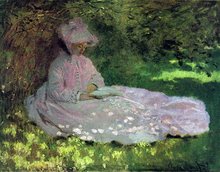In the whole wide world of information on the web, this is the only factual information I could find other than this blog entry by Nancy Turner herself:
#1--1st person vs. 3rd person narrator
I guess after reading the book narrated by Death, I much prefer 1st person perspective. I like that we know what Sarah's views and feelings are on the matters she faces... I didn't like the way Death interpreted people's actions and why they might have done what they had done. Sarah just stated the facts plain and simply. She didn't judge people unfairly in my opinion, she just followed her honest gut feelings and I think they served her very well. Even in the case of Felicity.
#7--themes: thirst for education, etc.
I don't think it was odd for Sarah to thirst for education like she did. Even in her day. She had an instinct for survival and education was something that would have a hand in her means to keep her family safe. I personally loved how she questioned the doctor's diagnosis and went to find more information on her own. Sure, the outcome wasn't what she had hoped, but she did the right thing and kept all kinds of information at her fingertip even prior to Suzanne's scarlet fever. Also, her realization (per Blue Horse) that education is like a tree... that will stick with me forever.
#2 and #4 together--the heroic in women's everyday lives
I agree with Katie here. All women are heroes. They are! Each of us has a mission in life and each of us has a special work ethic and distinct drive to survive and move forward. It's amazing what we can accomplish in a day, with horrible environments, relationships and whatever else that might make us "fit to be tied" as Sarah would say. I could totally imagine feeling as low as Sarah did after Jimmy died. How did she keep going with a small baby and all that work on the ranch? I think if we each knew what each of us faces, we'd wonder how each of us could move forward as well. But we do and we survive and we are stronger for it.
#9 and #11 together--the relationship of Sarah and Jack
Passionate. Unique. Equal. Unconditional.
I found their relationship so humorous. I could tell they'd eventually end up together because she was always so peeved by him. And even when they were married she'd disown him on every other journal entry. Their chemistry was just wonderful and even though Jack's good-bye was heartbreaking, I knew she'd survive and be fine, just like he did.

